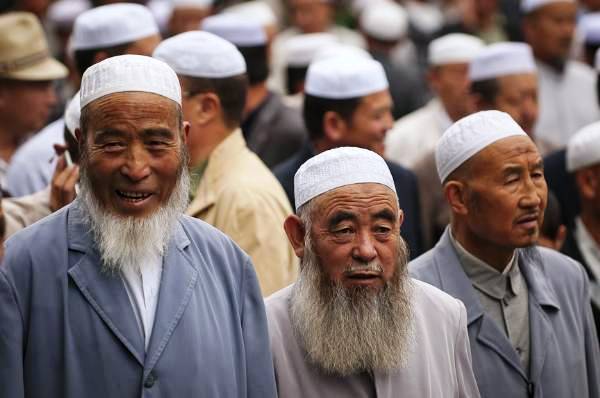Silence of Muslim World on Uyghurs
September 7, 2019 | Expert Insights

Background
China is home to a sizeable Muslim population– around 1.6% of the total population, or around 22 million people. Islam has been in China since the 7thcentury with 10 distinct adherents namely Hui, Uighur, Kazakh, Dongxiang, Kyrgyz, Salar, Tajik, Uzbek, Bonan and Tatar. The most prominent, and currently the focus of world attention, are the Uyghurs, a Turkic ethnic group inhabiting the Xinjiang Autonomous region and numbering about 11 million.
According to the UN, Uyghurs are being subjected to arbitrary detention, torture, egregious restrictions on religious practice. However, this persecution has remained on the sidelines of international consciousness as China is ultra-sensitive to any criticism on this account. It maintains that like the West, it too is combating “ terrorism” and “ religious extremism”.
Analysis
The Uyghurs on their part have also not been very subdued. They had staged several uprisings against Chinese rule in the 1920s and received Soviet support for their nationalist agenda. Uyghur separatists claim that Xinjiang region is not a part of China and was illegally incorporated by the PRC in 1949. Reports of acts of terrorism/ knifing attacks by Uyghur radicals continue to appear in the Chinese media.
Although the Chinese minority policy has recognised the Uyghur ethnic identity as distinct from the Han population, the Uyghurs still fear that they are being eradicated as an ethnic and cultural group.
Tensions have been escalating since 9/11 and reached a boiling point in 2009 when ethnic riots erupted between the Uighurs and Hans throughout Xinjiang province. Since then, the Chinese state has slowly and quietly increased restrictions on Uighurs and other Muslim minorities. Practising Islamic beliefs have been forbidden in various parts of China.
In January 2019, China enacted a law that sought to "Sinicise" Islam within five years. Sinification is a process of dissolving non-Chinese communities into the majority Han Chinese culture.
In the past 18 months, tensions have been greatly stoked by the unlawful incarceration of approximately 1 million Muslims in “re-education camps.
Following the report by United Nations, US Secretary of State Mike Pompeo and Treasury Secretary Steve Mnuchin, both Republican and Democratic members of Congress, called for sanctions on Chinese officials implicated in the internment of Uyghurs. The focus on human rights came as trade disputes mounted between the world’s two largest economies and were timed with US sanctions against China’s purchase of Russian military jets and weapons.
While the West has at long last begun to pay attention to the plight of the Uyghurs, the Muslim world continues to maintain a front that all is well with the Uyghurs. At the beginning of March 2019, the Organisation of Islamic Cooperation (OIC) passed a resolution which praised China for “providing care to its Muslim citizens”.
In July 2019, in a move that surprised even China, 22 countries raised concerns at the UN about “large-scale places of detention, as well as widespread surveillance and restrictions”. The letter marks the first major collective international challenge to China's ongoing policy in the far western border region.
In response, ambassadors from 37 countries, including many prominent Muslim countries like Saudi Arabia, Bahrain, Kuwait, Syria, Pakistan, Egypt, Algeria and UAE, issued a joint letter expressing support for China’s policies with respect to ethnic Uyghur in Xinjiang region. Qatar, originally a signatory, later withdrew.
In February 2019, Turkey had issued a stern statement denouncing China for violating human rights of Uyghur Turks and other Muslim communities. Yet when Turkish President Erdogan, the self-styled defender of Muslims worldwide, visited China, state media reported that thanks to China’s general upward economic trajectory, he said all the people in Xinjiang were “living happily”.
Erdogan’s attitude is typical of the approach taken by the world’s most prominent Muslim leaders toward the Uyghurs.
On this topic of China, many Muslim countries appear to be singing the same tune. "China's treatment of parts of its Muslim population is not a partisan issue in the Arab world," said HA Hellyer, senior associate fellow at Royal United Services Institute in London and the Atlantic Council in Washington, DC. "Even if they disagree on a whole slew of other issues, such as the (Gulf Arab) crisis, Syria, Yemen, Iran and so forth," said Hellyer, "no Muslim leader in the Arab world or the wider region, including Turkey, seems to have much compunction about lining up alongside Beijing”.
China has denied accusations of mistreatment and deems the criticism within the UN council to be interference in its sovereignty. China is a member of the 47-member Human Rights Council. A senior diplomat stated that Beijing's counterterrorism and de-radicalisation efforts in Xinjiang should be applauded for creating a new method of handling the problem.
Assessment
- China’s economic clout is paying rich dividends on the political and diplomatic front. Xinjiang is the first leg in the new “Silk Road” that connects China to the Arabian peninsula. The Arabian countries are in support of China’s Belt and Road Initiative (BRI). Likewise, Pakistan depends on the BRI to pull its struggling economy from collapse. Economic interests reign supreme over political, religious and ideological differences.
- The Uyghurs have displayed a tendency towards an extreme form of Islam and proclivity for radicalisation which has not earned them any sympathy from the world at large or endeared them to the Muslim ummah.
- Uyghur fighters waging jihad under the ISIS banner and demanding an autonomous state of “East Turkestan” under a Salafism philosophy fosters suspicion and division among Muslim countries, most of whom are themselves combating zealots within their respective borders.
- The US and its allies would leverage the current Uyghur situation to bring all-round pressure on China to meet their own strategic interests including favourable trade conditions.
Read more
Image Courtesy: mvslim.com








Comments